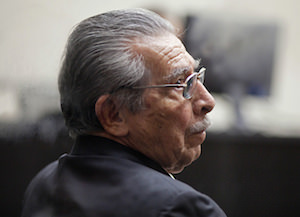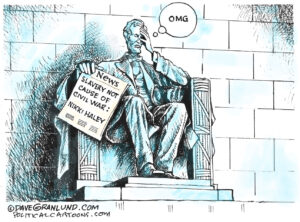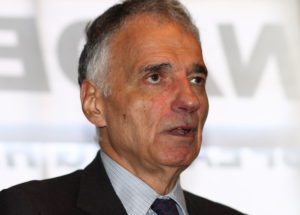Truthdiggers of the Week: Judges, Prosecutors of Efraín Ríos Montt
Those who Friday convicted the Guatemalan dictator of genocide and crimes against humanity showed that political killers can be brought to justice in the modern world.
Every week the Truthdig editorial staff selects a Truthdigger of the Week, a group or person worthy of recognition for speaking truth to power, breaking the story or blowing the whistle. It is not a lifetime achievement award. Rather, we’re looking for newsmakers whose actions in a given week are worth celebrating. Nominate our next Truthdigger here.
On Friday, three judges found Efraín Ríos Montt, a former general and dictator who ruled Guatemala during one of the deadliest periods of its long civil war, guilty of genocide and crimes against humanity. Montt, 86, received an 80-year sentence and will spend the rest of his life in prison if attempts to appeal the verdict fail.
Over the course of five weeks, the court heard testimony from more than 100 witnesses including psychologists, military experts and survivors of the country’s massacres. Members of the Maya Ixil Indian group spoke of how Guatemalan soldiers raped and killed their families and destroyed their villages. (Watch some of the Mayans tell their stories in a short video published by The Guardian here).
The judges found that Montt knew of the intentional and systematic attacks on the Ixil people and did nothing to stop them. “We are completely convinced of the intent to destroy the Ixil ethnic group,” Judge Yasmín Barrios said.
The slaughter killed more than 1,700 people in Guatemala’s Mayan region after Montt seized power in 1982. Speaking on “Democracy Now!” on Friday, investigative journalist Allan Nairn, who has been attending the Montt trial, said the total death toll from the civil war, which began in 1960 and ended in 1996, amounted to something like a quarter million.
Montt clung to claims of his innocence throughout the trial. But in 1982, after Montt took power and sent the army through indigenous regions, Nairn asked the dictator about the civilian killings. At that time Montt responded: “Look, for each one [guerrilla] who is shooting, there are 10 working behind them,” referring to the guerrillas’ unarmed supporters. To this, Montt adviser Francisco Bianchi said, “We have to kill Indians, the Ixil people, because they have sold out to subversion.”
Later, when Montt was ousted, Nairn asked him whether he should be put on trial for the massacres, and since Montt was a big supporter of the death penalty, executed should he be found guilty. “Yes, try me! Put me against the wall!” Montt said. But, Nairn explained, the leader insisted that if he was going to be put on trial, then his American supporters — including Ronald Reagan, whom he mentioned specifically — should face the law as well.
Nairn reports that the killings were no secret. “They were acts of state terrorism where a big part of the point was publicity,” he told “Democracy Now!” “When the assassinations were done in the cities, they would often make a point of throwing the bodies in the streets to terrify onlookers. In the massacres in the countryside, the executions would — and torture interrogations would often be carried out in the village square with all the survivors looking on so they would get a lifelong lesson that they would never forget, as they saw their families and their loved ones being strangled and shot in the head.”
It was during these events that Reagan told the world that Montt was a man of integrity who was devoted to democracy. Against accusations of murder, Montt would respond: “It’s not that we have a policy of scorched earth, just a policy of scorched communists.”
Montt’s claim that he was ignorant of the slayings runs contrary to reports by and about the military commanders circulating through the indigenous areas at the time. With “only three, and at some points two, layers of authority between Ríos Montt and the killers,” Nairn cannot see how the dictator could not know what was going on. One of Montt’s commanders was Guatemala’s current president, Otto Pérez Molina. Nairn said that “dozens and dozens of subordinates of Pérez Molina who I interviewed there at that time described how they were under orders to torture and kill civilians, and also how they made hourly radio reports back to headquarters.
“They wrote up a daily diary of operations,” he said. “As one Subcommander Lieutenant Romeo Sierra put it, they were on a very — they were on a very short leash.”
Nairn says that the next question of concern is this: If Ríos Montt is guilty of genocide, then what about the man who oversaw the killings — Molina? According to Nairn, Molina allowed the trial to proceed only under the terms that his name would not come up. Nairn too was supposed to testify but was blocked at the last minute because, he believes, he would name Molina.
What also of Montt and Molina’s enablers? “What about the U.S. sponsors who were providing the weapons, the money, the bombs, the bullets and the political support for the crimes for which Ríos Montt may today be convicted of genocide?” Nairn asks.
“Guatemalan criminal courts have the authority under international law to bring in U.S. defendants. U.S. criminal courts have that same authority. If there’s a verdict today against Ríos Montt, that will be the challenge sitting on the — put to the American and the Guatemalan criminal courts: What’s next? Will you now look at Pérez Molina? Will you now look at the Americans who made this genocide possible?”
Criminals, as they say, are thick as thieves. State leaders and their friends in business and elsewhere protect one another. It is surprising to many that a modern government would allow the prosecution of a former leader to go forward. The U.S. criminal justice system is broken, and no one expects a broken thing to begin working spontaneously. The conviction of George W. Bush for the Iraq War, or of Barack Obama for a drone campaign that a United Nations expert said could qualify as a “war crime,” is unthinkable in the United States.
For giving oppressed people everywhere a sense that they are not entirely alone in their struggle against their rulers, and for providing the world an example worth following, we honor the judges and prosecutors of Efrain Ríos Montt as our Truthdiggers of the Week.
— Posted by Alexander Reed Kelly.
Your support matters…Independent journalism is under threat and overshadowed by heavily funded mainstream media.
You can help level the playing field. Become a member.
Your tax-deductible contribution keeps us digging beneath the headlines to give you thought-provoking, investigative reporting and analysis that unearths what's really happening- without compromise.
Give today to support our courageous, independent journalists.






You need to be a supporter to comment.
There are currently no responses to this article.
Be the first to respond.